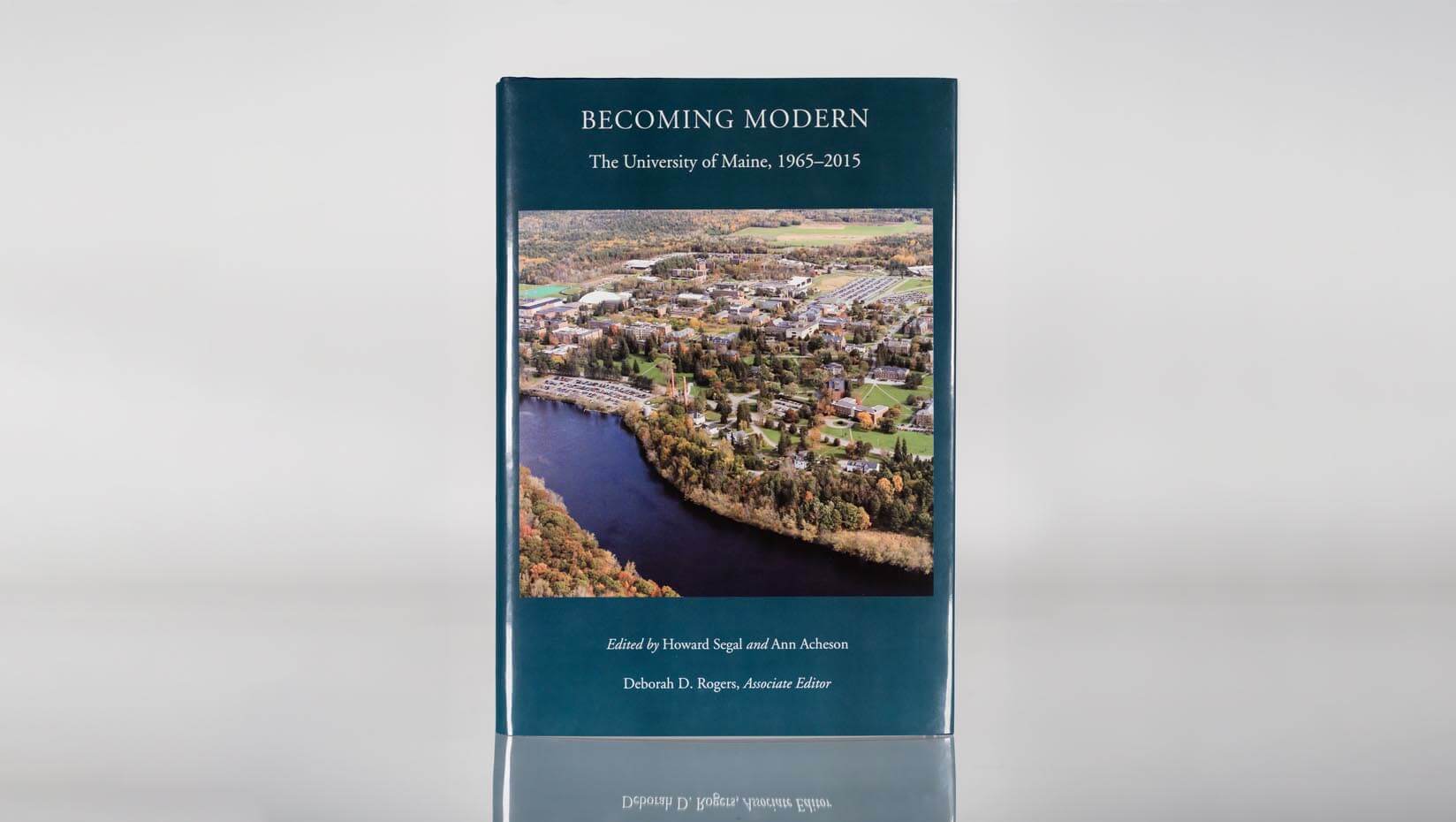
New book details UMaine’s journey of ‘Becoming Modern’
The University of Maine marked its 100th anniversary in 1965, prompting widespread celebration and discussions of its future.
University leaders, community members, policymakers and other supporters devised plans to bolster enrollment, programs, research and public service. Yet the transformative growth UMaine experienced in the five decades between its centennial year and 2015 surpassed these visions, according to a new book published by University of Maine Press.
“Becoming Modern: The University of Maine, 1965–2015” features 33 essays that depict UMaine’s transition from a traditional land grant university — one primarily focused on agriculture, business and engineering — to “a vastly more diversified institution with a national and international reputation in many fields.”
“As the University of Maine’s academic offerings, research and scholarship enterprise, and engagement continue to evolve, having read about one of the most transformative periods of its history has been enriching and inspiring,” said UMaine President Joan Ferrini-Mundy. “I commend the editors for creating such a compelling book filled with in-depth information and diverse perspectives on our modernization. I am confident it will captivate any reader and inspire the higher education leaders of tomorrow.”
Readers will learn about the foundation and expansion of scholarship, research and service in a variety of fields during the late 20th century, including marine science, climate change, public policy, renewable energy and the performing arts.
They also will explore the vast changes in athletics, Fogler Library, relations with the town of Orono, and graduate and honors education. Additionally, a few essays in the book discuss expanding opportunities for women and Indigenous scholars at UMaine at a time of growing social change nationwide.
“I think people will learn a lot from the book and will have a new appreciation for the University of Maine,” said Betsy Rose, publications specialist with the University of Maine Press, a division of Fogler Library. “I was especially intrigued by how things changed for women between 1965 and the present, how the Climate Change Institute evolved, and how hard faculty worked to get support from the state legislature in the 1990s.”
The late Howard Segal, editor of the book and former UMaine history professor, began working on the book in 2012. He solicited essays from 46 contributors — faculty, staff and students from varying disciplines — and wrote the introductory and concluding chapters.
In addition to showcasing UMaine’s historic milestones following its centennial, Segal described forecasts from 1965 about how UMaine would evolve. In “Back to the Future: An Introduction,” the book’s first essay, Segal wrote that these predictions show “what those visions reveal about the persons, movements, organizations and culture that project them.”
After Segal’s death in 2020, his wife, Deborah Rogers, associate editor and UMaine English professor, and co-editor Ann Acheson completed the book, which retiring University of Maine Press Director, Michael Alpert, designed and typeset.
“As a historian of American technology and utopianism, Howard worked for the perfectibility of institutions, government, society and culture,” said Rogers. “He wanted to create this book as a contribution to land grant history and the history of a university that was dear to his heart. It’s bittersweet that Howard didn’t live to see its completion, but I know it would have given him enormous satisfaction and pride, as it does to all of us who collaborated on this project.”
Since the University of Maine was one of the first land-grant universities, Segal wanted to examine its importance in the evolution of these institutions, which were established nationally by the Morrill Land Grant Act of 1862. In the prefix, he wrote, “All articles in the book aim to provide a delicate balance between a coffee table book and a serious scholarly work. I hope this volume can contribute not only to land-grant historiography but also to the history of ‘the college of our hearts always.’”
“Dr. Segal’s labor of love, which picks up where ‘The First Century: A History of the University of Maine, 1865–1965’ left off, is a great contribution to the UMaine Press publications, which include such important regional works as “A Passamaquoddy – Maliseet Dictionary: Peskotomuhkati Wolastoqewi Latuwewakon” and the award-winning Historical Atlas of Maine,” said Daisy Singh, dean of libraries at UMaine. “It is also a crowning achievement for retiring Director Michael Alpert who, along with Associate Provost for Academic Affairs and Faculty Development and Acting Press Director Gabe Paquette, have begun a strategic planning process which will usher in a period of increased visibility and digital access to UMaine Press publications.”
The book is available for purchase online and at the University Bookstore.
Contact: Marcus Wolf, 207.581.3721; marcus.wolf@maine.edu
